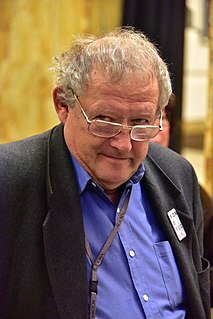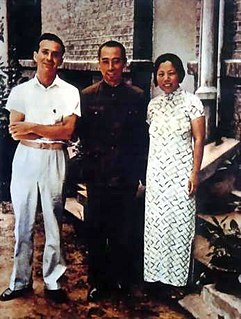Top 136 Mao Quotes & Sayings - Page 3
Explore popular Mao quotes.
Last updated on April 20, 2025.
Strong countries and strong presidents talk to their adversaries. That's what Kennedy did with Khrushchev. That's what Reagan did with Gorbachev. That's what Nixon did with Mao. I mean think about it. Iran, Cuba, Venezuela - these countries are tiny compared to the Soviet Union. They don't pose a serious threat to us the way the Soviet Union posed a threat to us. And yet we were willing to talk to the Soviet Union at the time when they were saying we're going to wipe you off the planet.
When I see the mostly young people of Occupy Wall Street - a mixture of the bored, the nihilistic, the seekers of excitement, the left-wing true believers, the confused idealists and those hoping to engage in violence - railing against the rich capitalists on Wall Street, I get worried. Because the hatred they express toward the rich is similar to that expressed against the rich by Stalin, Mao and Pol Pot. Of course, these people are not comparable to those killers. But class hatred must lead to bad things. That is why President Obama is playing with fire with his attacks on the rich.
Political systems must love poverty-they produce so much of it. Poor people make easier targets for a demagogue. No Mao or even Jiang Zemin is likely to arise on the New York Stock Exchange floor. And politicians in democracies benefit from destitution, too. The US has had a broad range of poverty programs for 30 years. Those programs have failed. Millions of people are still poor. And those people vote for politicians who favor keeping the poverty programs in place. There's a conspiracy theory in there somewhere.
I think his portraits of Jackie, Liz, Marilyn, Mao, Elvis, Lenin - and objects like the soup cans, the dollar signs, the hammer and sickle, it's all about icons. Its all about what people worship in an irreligious or secular world. In terms of Andy's personality and Andy Warhol as a human being who I was very close to, I still feel kind of sorry for him on a personal level. I mean, he was the ultimate example of great success wrapped around inner turmoil and emotional pain.
It is Chairman Mao who should be held primarily responsible for the Great Leap Forward. But it didn't take him long - just a few months - to recognize his mistake, and he did so before the rest of us and proposed corrections. And in 1962, when because of some other factors those corrections had not been fully carried out, he made a self-criticism. But the lessons were not fully drawn, and as a result the "Cultural Revolution" erupted.
It's funny that Chairman Mao's great hero was Napoleon, because Napoleon started out as a revolutionary for the underdogs and then made himself an emperor. In fact, a lot of revolutionary leaders do that, and you think, "Well, that's spoiling your argument. What are you doing?" But on the other hand, the people themselves are enjoying trying out all these different ways to be. I hope that, like the Japanese, the Chinese hang on to their own traditions as well as try out Western ones. I hate it when people just lose so much confidence in who they are that they abandon their own culture.
So far as Chairman Mao's own hopes were concerned, he initiated the "Cultural Revolution" in order to avert the restoration of capitalism, but he had made an erroneous assessment of China's actual situation. In the first place, the targets of the revolution were wrongly defined, which led to the effort to ferret out "capitalist roaders in power in the Party". Blows were dealt at leading cadres at all levels who had made contributions to the revolution and had practical experience, including Comrade Liu Shaoqi.
It's a real enigma why people are so averse to real free market capitalism even now. Here we are, in the century that has seen Lenin, Stalin, Mao, Hitler, Castro, Pol Pot-and we're still being warned against the 'robber barons' of the 19th century. I don't know that Jay Gould or John D. Rockefeller ever killed anyone. The State has killed countless people, and yet we're always supposed to remain on guard against these 'greedy villains' of yesteryear.
I would be quite content if I myself could be rated fifty-fifty in merits and demerits. But one thing I can say for myself: I have had a clear conscience all my life. Please mark my words: I have made quite a few mistakes, and I have my own share of responsibility for some of the mistakes made by Comrade Mao Zedong. But it can be said that I made my mistake with good intentions. There is nobody who doesn't make mistakes.
Karl Marx was the foremost hater and most incessant whiner in the history of Western Civilization. He was a spoiled, overeducated brat who never grew up; he just grew more shrill as he grew older. His lifelong hatred and whining have led to the deaths (so far) of perhaps a hundred million people, depending on how many people perished under Mao's tyranny. We will probably never know.
Today we reject the notion of equality between a regime that belongs to the democratic world - even if it is conservative and disagreeable - and a totalitarian dictatorship, whether its colors are black, red, or green. This is why we will never again say that Chamberlain is no better than Hitler, Roosevelt no better than Stalin, and Nixon no better than Mao Zedong, even if we do condemn Roosevelt for Yalta, Chamberlain for Munich, and Nixon for Watergate.
Chairman Mao was after all a principal founder of the Chinese Communist Party and the People's Republic of China. In evaluating his merits and mistakes, we hold that his mistakes were only secondary. What he did for the Chinese people can never be erased. In our hearts we Chinese will always cherish him as a founder of our Party and our state.
One Mongolian leader became a very, very brutal dictator and eventually became a murderer. Previously, he was a monk, and then he became a revolutionary. Under the influence of his new ideology, he actually killed his own teacher. Pol Pot's family background was Buddhist. Whether he himself was a Buddhist at a young age, I don't know. Even Chairman Mao's family background was Buddhist. So one day, if the Dalai Lama becomes a mass murderer, he will become the most deadly of mass murderers.
Socialism, whether it's the 'soft tyranny' of the EuroAmerican management state or the murderously repressive forms taken by Hitler, Stalin, Mao, or Pol Pot, is all about disindividuation, a steady, relentless erasure of the individual differences among us, everything that makes us who we are. 'Everybody in, nobody out!' is the marching mantra of militant collectivized medicine, but it accurately describes all other aspects of collectivism as well. No alternatives allowed, no choices, no individualism, no individuality, and ultimately, no individuation.
Mao lived very much like the rank and file of the Red Army. After ten years of leadership of the Reds, after hundreds of confiscations of property of landlords, officials and tax collectors, he owned only his blankets, and a few personal belongings, including two cotton uniforms. Although he is a Red Army commander as well as chairman, he wore on his coat collar only two Red bars that are the insignia of the ordinary Red soldier.
The influence of Sun Tzu on other North Vietnamese military strategists is harder to answer. Certainly many of the key leaders in Hanoi were aware of Sun Tzu and made use of his ideas - Vo Nguyen Giap applied many of these ideas in seeking out weak elements in the enemy's defenses, as did Truong Chinh, whose famous treatise, The Resistance Will Win (1947), cited the ideas of Mao Zedong as a model for the North Vietnamese to follow.












